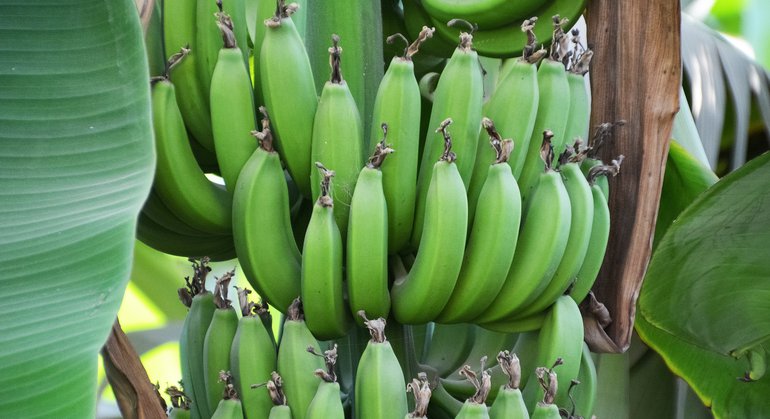


Bananas are the fruits which now considered one of Kenya’s main staple foods staple after maize, rice and wheat. Different communities all over the country consume bananas in one way or the other. It is one of the world's largest herb which is not a tree. The fruit type of banana is also considered a berry.
A typical banana plant has 8 to 30 leaves that range from 12 feet long and 2 feet wide. Bananas are also known to be rich in a number of vitamins and minerals these includes vitamin A, B, C and G.
Despite the significant commercial value of the crop, the main production constrain is the availability of reliable and safe planting material. Banana is a crop that has been for many years conventionally propagated by vegetative means by Kenyan farmers, but there are several short comings in this normal cultivation of banana which require to be addressed to meet the market demands.
Due to a widespread problem of viral diseases ravaging bananas around Kenya, in vitro or tissue culture bananas propagation has been used by Kenyan researchers to produce disease free growing materials. Tissue culture is the modern science of multiplying clean disease-free planting materials of different crops and you have many identical copies of the same variety without changing the taste and any other physical attribute of the plant.
This tissue culture work is done in agricultural laboratories and then the plants are raised in nursery beds where farmers can buy them ready for planting. These plants are genetically uniform, superior, disease free and high yielding. This leads to increased economic benefits per unit area of land.
Why tissue culture?
The traditional banana propagation method using suckers has proven to be inefficient and has constantly provided lower quality bananas compared to tissue culture, these may be caused by a variety of reasons. Suckers generally may be infected with some pathogens and nematodes. Similarly, due to the variation in age and size of sucker the crop is not uniform, harvesting is prolonged and management becomes difficult.
Problems in conventional banana farming:-
The traditional banana farming has always encountered various problems as we have listed below
The reasons behind all these problems can be attributed to the non-availability of disease free quality planting material and lack of hi-tech farming awareness among the growers. Mass propagation of disease-free high yielding clones to produce consistently uniform and true to type plants by tissue culture is the only alternative for banana plantations.
Tissue culture banana technology
Tissue culture is the current technology that is applied for mass production of superior grade planting material for most of the crops. It is widely used to create clone plants of mother plant. This technology utilizes any part of the plant leaf, stem, root suckers, etc. for regeneration of a complete whole plant.
The process consists of some basic steps:
Strict adherence to aseptic standards and micro-climatic conditions and care during the hardening process alone can ensure the success of your tissue culture bananas.
Advantages of tissue culture raised banana:-
The benefit of tissue- cultured plants is that they are uniform, so they grow at the same pace and are ready to harvest at the same time. It makes management of the plantation that much easier
Characteristics
Conventional banana propagation through suckers
Tissue Culture Banana
Yield & Quality
Low
High
Variety
Mixed
True to type
Flowering
Uneven
Synchronous
Harvesting
16-18 months
12-13 months
Market price
Lower
Higher
Disease
No guarantee
Free from all diseases when supplied
De’nettols seedlings offers the best quality tissue culture banana plants, carefully grown from high quality seeds and adhering to the recommended and required tissue culture practices to ensure the success and good returns on investment. We also provide expert advice on how you can replicate our success in your own farm. Contact us today or visit our tree nursery to get more information.
Lorem ipsum dolor sit amet, consectetur adipiscing elit, sed do eiusmod tempor incididunt ut labore et dolore magna aliqua.
FIND
What you need to know to grow tissue culture bananas successfully Nov. 1, 2020 Growing mangoes the right way in Kenya Dec. 8, 2020 Growing the tree tomatoes in Kenya Dec. 15, 2020 A brief macadamia farming guide for the Kenyan farmer Dec. 22, 2020 Protecting and getting the most from your tree tomato fruit seedlings Dec. 29, 2020 Maximizing your macadamia produce in Kenya Jan. 5, 2021 Mango tree planting guide Jan. 12, 2021 What are tissue culture bananas and why are they best suited for Kenyan farmers Jan. 12, 2021 A starter Guide Grape farming in Kenya Jan. 19, 2021 Growing apples in kenya - The definitive guide Jan. 20, 2021 Growing strawberries - planting, growing, and harvesting strawberries Jan. 28, 2021 Growing the dragon fruit in Kenya, A complete beginners guide Jan. 13, 2021 The kiwi fruit farming guide for Kenyan